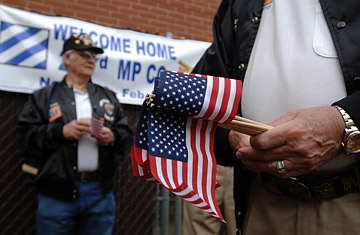
Bob Wolford and members of the Vietnam Veterans of America give out small American flags before a homecoming ceremony for the U.S. Army's 293rd Military Police Company Fort Stewart, Georgia.
(2 of 2)
On Thursday nights, about a dozen Iraq-war vets and a handful of Vietnam and Korea vets cram into the stark white room of an Oceanside, Calif., hospice — a blank canvas for colorful war stories. The support-group meetings are facilitated by Tim Jordan, a Gulf War vet with full facial hair and a graying ponytail, who's earning his master's in psychology. He tells them to try to meditate for just five minutes each day, to go to the ocean and concentrate on the waves. The advice seems a little Zen-like to these iron-tough soldiers, but most say they will try it. "Sometimes I think, Is there anything really wrong with me?" says Marcolongo, who also uses techniques like acupuncture to heal. "Then I go to the meetings, and I realize what other people are saying is exactly how I feel. I know I have to keep going to get it all out."
Rider and the older vets wait until the meetings end to talk privately to those who have opened up in a new way, who seem especially distressed or who simply display the look that Rider knows so well. "I don't want to be presumptuous and say, 'Here's the answer,' because the answer isn't the same for everyone," Rider says. "It's better if they come to it themselves."
When two meeting regulars, war buddies Scott Stanco, 36, and Josh Thomas, 32, returned from Iraq in October 2006, their nightmares were so intense that they slept with weapons by their bedsides and patrolled their homes — armed — in the middle of the night. Even worse, they stopped feeling love for their wives (each has been married for more than 10 years). "When I got home, I didn't feel comfortable talking to the civilian population," says Thomas, whose vehicle was struck by an IED in Iraq, causing a severe concussion and facial burns. "I have anger issues with them. It just bothers me that they go about their daily lives, going to Starbucks and stuff." The two friends have found a counselor and sounding board in Rider, the Vietnam vet. "They call me at home like I'm a doctor," says Rider, who keeps up that doctor-patient act outside group meetings. Says Thomas: "If I don't show up for a week, Bill calls me, e-mails and says, 'Hey, warrior, where have you been?' " Thomas, who still wants to return to Iraq with the Marines, says, "I meet him all the time for lunch and dinner. Because who else would we have? We only have each other."
"Veterans in the Vietnam generation have a lot to offer," says Dr. Ira Katz, director of mental health for the VA. "Whether it's mentorship of veterans from prior eras or peer support, seeking that help is an important step." ACVOW, one of dozens of similar groups and hundreds of individual Vietnam veterans nationwide are using their experience to guide the new generation of veterans with group therapy and by pointing them in the direction of good professional help.
The legacy of the Vietnam vets may extend farther into the future. Marcolongo knows that no veteran should ever feel isolated or alone again. He realized this soon after his first meeting with ACVOW. His wife Lisa remembers his instant relief: "His shoulders just came down from his ears, and he was immediately breathing easier." He knows that the Iraq war won't be the last war and that it's his responsibility as a combat veteran to be a resource for the next generation. "He's going to continue the Vietnam vets' mission," Lisa says. "We certainly don't want a whole other generation of vets realizing much later that they have psychological problems. Let's nip this in the bud now."
